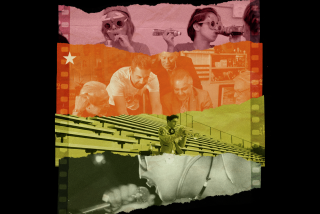It Doubles for World Trouble Spots : Venezuela Suddenly Becomes Film Location-of-Choice
- Share via
CARACAS, Venezuela — Pssst! Looking for unspoiled scenery, cheap extras and good local technicians for filming on location?
It’s still a word-of-mouth proposition, but some of the world’s leading film makers are discovering Venezuela’s steamy jungles, vast savanna and palm-studded beaches for shooting their exotic location shots.
The South American country is being promoted as a cheaper and more accessible alternative to Brazil and a non-politicized substitute for South Africa.
British producer Derek Granger brought Sir Alec Guinness and James Wilby, star of “A Room With a View,” to the jungles near Canaima, 400 miles southeast of this capital, in late January to film a portion of “A Handful of Dust,” based on the novel by Evelyn Waugh.
The French director Alain Siritzky came in November to check out scenery in Canaima and Caracas for the sixth movie in the “Emmanuelle” series, now being shot for him by a local film group.
Last October, two episodes of the TV series “Dynasty” were filmed here. They involve a jungle rescue.
And Venezuela recently beat out Jamaica to provide various beach sites for a series of Pepsi-Cola commercials.
George Korda, a Hungarian-born Venezuelan whose company, Korda Films, is undertaking the “Emmanuelle” project, said: “For directors who are interested in the kinds of scenes shot in Brazil or Mexico or Argentina, we are unbeatable: We’re the cheapest, the freshest and we have good technicians.”
Film makers attribute the growing interest in Venezuela in part to the never-ending quest by directors for something unique and untouched--something that, ideally, no other director has used before.
“Everybody knows about Brazil and Mexico, and they’re a bit tired of that, so they’re discovering Venezuela,” Korda said.
But Venezuela’s attitude toward foreign film makers has also changed, film makers said, along with the value of the nation’s currency. Successive devaluations of the bolivar since 1983 have made it possible for directors to put up actors and crewmen in top hotels for $20 a night. Extras can be hired for $13 a day--a marvelous wage in a nation where the urban minimum wage is $65 a month.
Foreign directors said they have found local production companies fully competent for backup work. Many Venezuelans in film were trained abroad under government scholarships.
And Venezuela’s jungles are also more accessible, because they are smaller than Brazil’s vast Amazon basin and closer to population centers.
“Our location manager said it would be easier (to film here) than work in the heart of Brazil,” Granger said. “We had only 10 days to film. We needed good immediate facilities, good hotels and easy means of transport.”
And the government, which has been interested in promoting tourism since oil prices fell, is content to see the movie people come, local promoters said.
However, some have found the government difficult to work with. The arts crew of “A Handful of Dust” could not get the Venezuelan Guayana Corp., which controls the national park in which Canaima is located, to provide the animals. So they instead had to rent parrots, monkeys and deer from a local landowner.
But there’s another message that Venezuelan promoters are beginning to whisper: “Stable government, no racial problems.”
Except for the animals, some Venezuelan landscapes are dead ringers for the South African savanna.
This new selling point could take on more weight as more studios, including the 120 Americans banded together in the industry pressure group Filmmakers United Against Apartheid, seek to avoid possible commercial backlashes from filming in South Africa.
“There are places here that look just like South Africa, only we’re much closer, and we don’t have racial problems or a civil war,” said Rolando Haiek, whose company, 5247 Producciones, was hired by Granger to provide everything needed locally for “A Handful of Dust.”
5247 Productions now hopes to get a Canadian production company to film “Miss Helen,” a story set in South Africa, in Venezuela instead.
More to Read
Only good movies
Get the Indie Focus newsletter, Mark Olsen's weekly guide to the world of cinema.
You may occasionally receive promotional content from the Los Angeles Times.










